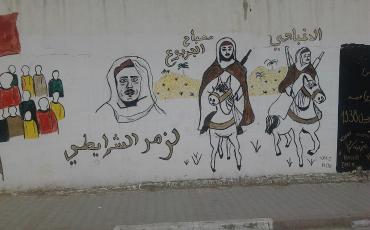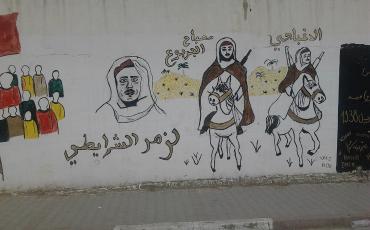Mounir Baatour aimed to become Tunisia's first openly gay president, but his candidacy has been rejected. Prior to that, Tunisian LGBTIQ * activists have criticized him sharply. By Julia Nowecki and Eva Tepest
Mounir Baatour is the first openly gay person to submit his candidacy to a presidential election in an Arabic-speaking country. His mission causing controversy was to be expected. More surprisingly, it has been numerous Tunisian LGBTIQ* activists that have sharply criticized the 48-year-old lawyer.
"Baatour asked all the young men around him to shave their heads. That's his fetish," reports Maroua. The Tunisian activist is a former member of Shams, a LGBTIQ* organization co-founded by Baatour and wants to remain anonymous. When a 17-year-old friend told her about Baatour's sexual advances, she demanded an explanation - and hit the wall: "Among Baatour's closest confidants it was always said that these were nothing but rumors of people who envied him for his success."
This not being an isolated case is confirmed by Yessine, a member of the Tunisian LGBTIQ* organization Mawjoudin. He also wants to remain anonymous. "Many boys who come to us were thrown out of their homes," he says. "Baatour initially promised them shelter and support when they turned to Shams." He then had asked them to shave their heads and commit sexual acts, Yessine continues. "Whenever we see a boy with a shaved head in our office, we know he's in danger," he condludes. Mawjoudin is one of 18 Arab LGBTIQ* organizations who, for this and other reasons, called on Baatour to resign from his candidacy.
Baatour rejects the allegations pointblank. "They are wrong and defamatory. If the signatories had had any evidence, they would have turned to the judiciary,” he explains in an interview with neues deutschland. But it's not that simple in Tunisia, explains LGBTIQ* activist Ramy Ayari, who has been living in exile in Canada since 2016. "A gay boy from a poor family cannot just go to a Tunisian police station, denounce an influential, wealthy person like Baatour and expect a fair trial," he states. Even after the revolution, Tunisia is ranked only 73rd in the Transparency International corruption index worldwide. And according to Ayari, marginalized victims of abuse in particular would have to fear social and disdain on behalf of their families, in addition to being prosecuted by law.
According to the Tunisian paragraph 230 men committing homosexual acts are still being sentenced to prison terms of up to three years. Ironically, it is Baatour himself who – in the context of his organization Shams – advocates for the decriminalization of homosexuality. In addition, the employees of the NGO offer health advice on sexually transmitted diseases and legal assistance.
For publicity reasons, however, Shams seems to resort to unfair means. In several cases, the NGO is said to have publicly outed clients against their will, according to the petition. "Our employees were told that these outings were the perfect strategy to attract attention," confirms Maroua. With forced outing, Baatour has also tried, according to Ayari and Yessine, to bring his alleged abuse victims to heel. That's one of the reasons as to why activists have not gone public. In addition, they fear that their allegations harm their own community in the Tunisian public.
According to Baatour, petitioners have a very different goal than LGBTIQ* emancipation. "These are anti-Semitic nationalists who want to wipe out Israel," declares the lawyer. In fact, the petition rejects Baatour's project of "normalizing with the Zionist entity". "We discussed this sentence extensively," explains Yessine, who spoke out against publishing that phrase beforehand. "Unfortunately, many leftist organizations in our country use it by default, and without questionining it." The fact that he could not prevail annoys him all the more, as the passage delivered Baatour a welcome clipping: "To portray us as anti-Semitic is a clear distraction tactic, especially towards Western countries."
A few days after Baatour officially announced his candidacy, he was banned from running the elections. The reason: In 2013, citing paragraph 230 the lawyer was sentenced for three months in prison, after he was initially convicted of the abuse of a 17-year-old boy.
The Liberal Party of Tunisia (PLT) has now challenged the decision. The rejection is "unclear and unfounded" and "highly suspicious," according to a press release. Whether the 48-year-old will in the end be admitted as a candidate to the election on 15 September, is currently unclear.
This article was published first in German language in the print edition of neues deutschland, 21.08.2019.






















